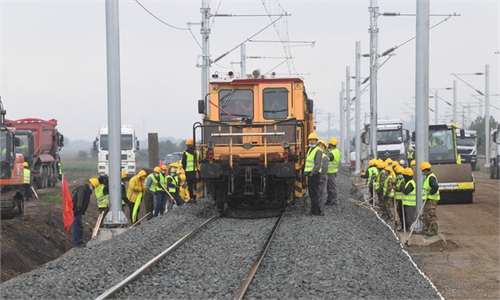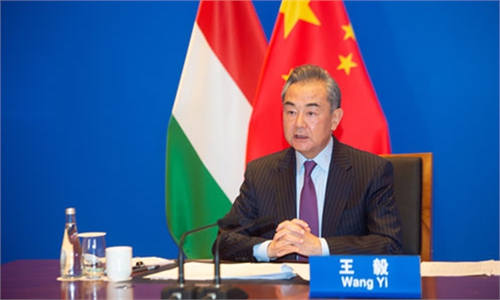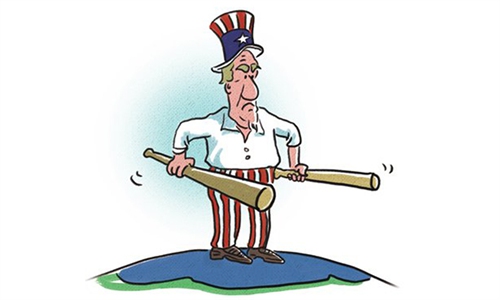IN-DEPTH / DIPLOMATIC CHANNEL
Hungary eyes a result-oriented approach to China, hopes EU-China investment deal a success story for all: Ambassador
Cherishing our heightened momentum
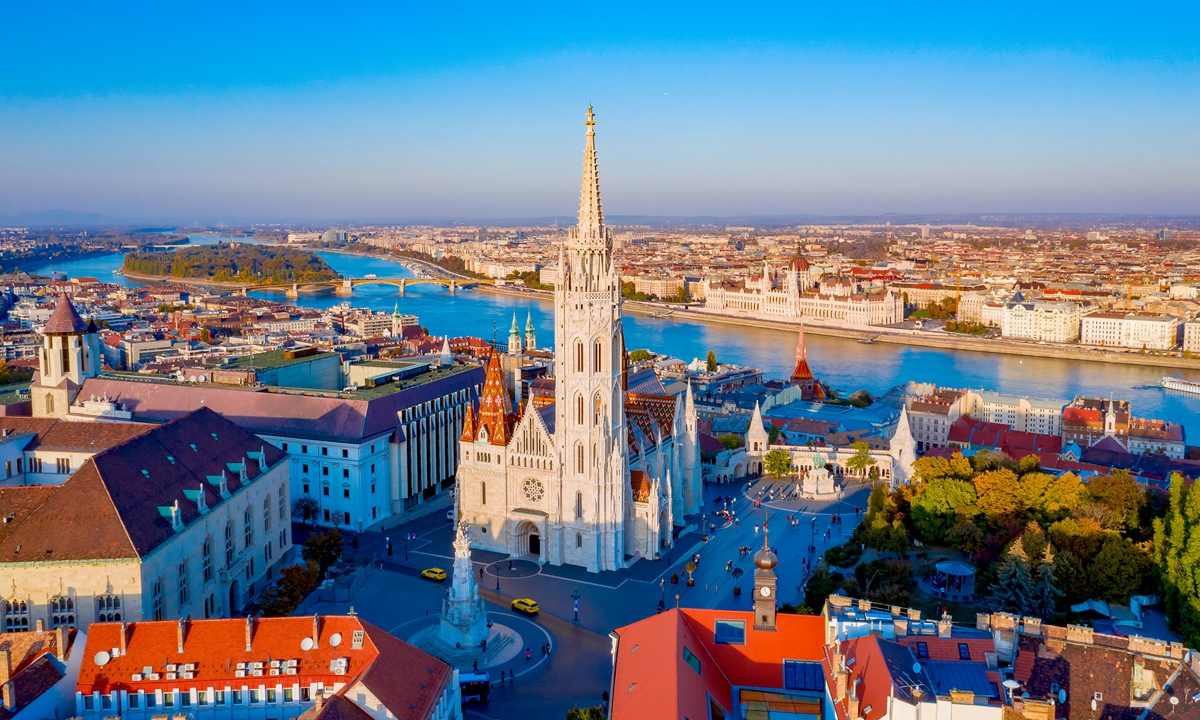
A view of Budapest, capital of Hungary. Photo: VCG
Editor's Note:Many Chinese people use the term "iron" to describe the intimacy of China and Hungary. While enjoying friendship that has lasted for decades, China and Hungary are exploring to promote their economic and diplomatic relations. The Global Times reporters (GT) Liu Xin, Fan Lingzhi and Zhang Weilan had an exclusive interview with Hungarian Ambassador to China, H.E. Mr Máté Pesti (Máté) and discussed timely questions of bilateral relations, future cooperation and regional topics.
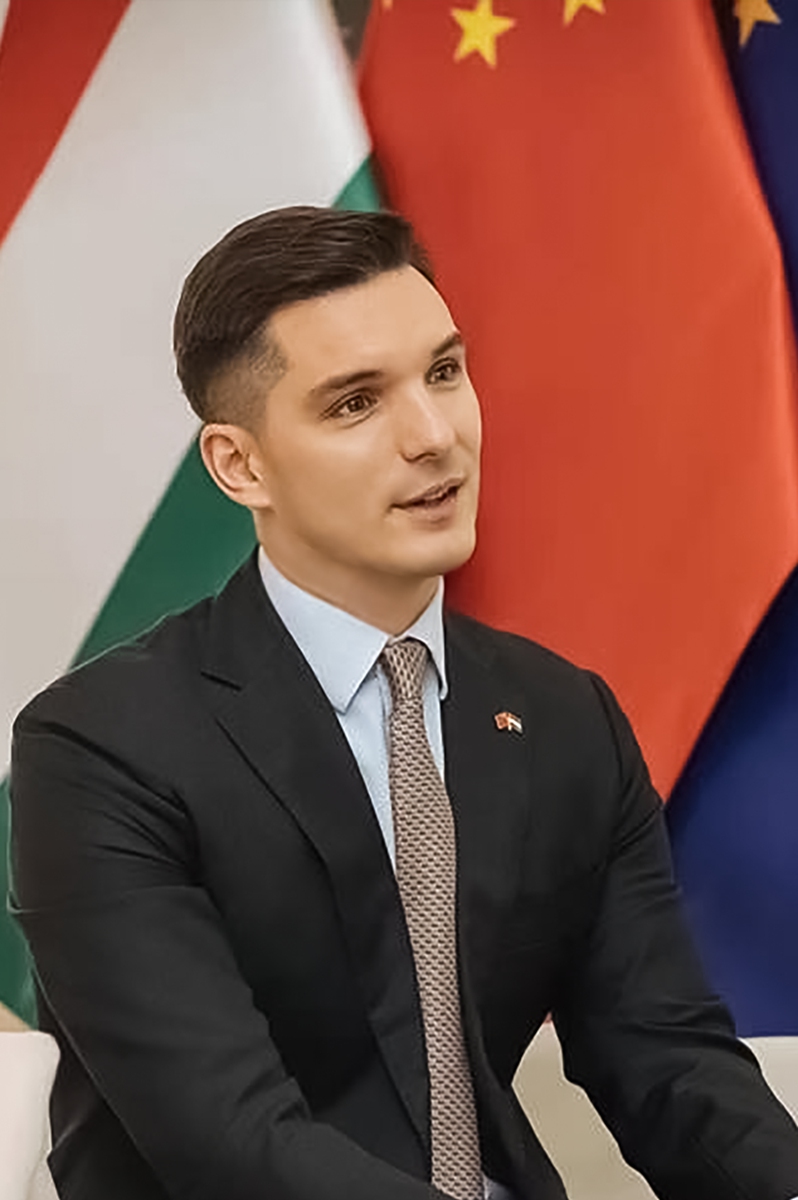
Hungarian Ambassador to China Máté Pesti.Photo: Li Hao/Global Times
GT: Many Chinese people use the term "iron" to describe relations between China and Hungary. Are there any similar expressions in your language to describe such an intimacy between the two countries? What are the reasons behind such a good relationship?
Máté: While we don't have a catchy phrase like "iron" in Hungarian to describe the very essence of the Chinese-Hungarian relationship and cooperation, we can certainly refer to our bilateral relations as "a partnership of firsts."
On October 3, 1949, Hungary was among the first countries to recognize the newly founded People's Republic of China (PRC). Later on, the format of the "China and Central and Eastern European Countries" was founded in 2012 in Budapest. In 2015, Hungary was the first European country to join the Belt and Road cooperation with China. In addition, Hungary was the first country that set up an RMB clearing bank in Central and Eastern Europe, and the first to issue on- and off-shore bonds, as well as green bonds on the Chinese market. Hungary was the first European country to open a bilingual primary and secondary school in Budapest and Fudan University will set up its first ever overseas campus in our capital. Hungary was also the first European Union (EU) member state that officially recognized the emergency use of the Chinese vaccine, and as such was the first to utilize Chinese vaccines in its epidemic prevention efforts, to immunize its population. I honestly believe that if there ever was a relationship between two countries that one may call exemplary, Hungarian-Chinese relations would definitely earn that title.
We have built our relationship based on mutual respect, and a pragmatic, mutually beneficial cooperation. Instead of focusing on what makes us different, both sides focus on better understanding each other, inter alia the will of each other's people. As a nation, we both originate ourselves and historically link ourselves to Asia, often describing ourselves as the most Western Eastern nation and the most Eastern Western nation. This is probably one of the reasons that enables us to understand and accept other traditions and cultures.
Over the years, general information amongst our respective people and intercultural communication has also been increasing. There are five Confucius Institutes in Hungary and 13 university faculties teaching the Hungarian language in China. The Liszt Institute - Hungarian Cultural Center in Beijing - opened its gates to the Chinese audience back in 2013, as the first from the Central and Eastern European region, with its raison d'être specifically being the strengthening of cultural ties. Working restlessly to promote Hungarian culture, it has gained wide recognition, not only in Beijing, but across all of China. The China Cultural Center in Budapest recently opened as well, adding yet another level to the bond between our nations. I believe that this rich cultural cooperation between the two countries is key to developing a deeper understanding and closer cooperation.
GT: We learned that you have lived in China for many years and are very well acquainted with the country. What has impressed you the most during your stay here? Do you think Hungarians know China well? Are there any plans to promote people-to-people exchanges after the COVID-19 pandemic?
Máté: As a guest in this country, I feel that the longer I stay in China, the humbler I must be regarding my knowledge of the country.
The speed of China's development is unprecedented, hitherto unseen anywhere else in the world. China went through tremendous socio-economic changes since the founding of the PRC, with the economy showing remarkable development even in the last four years. It is astonishing to see such a strongly work-based society, where work has a high moral value, and the rise in living standards is a direct result of their hard work.
I am also impressed by how much Chinese people are open to new technologies. The rapid digitalization of this country is fascinating, and the quick adoption to this new lifestyle makes this country incredibly competitive - both domestically and in a global context.
People-to-people exchanges between countries pave the way for friendship between their citizens, which is the foundation of bilateral relations. I am delighted to see that there is a growing familiarity with Hungary in China, and vice versa. After the COVID-19 pandemic, in order to strengthen these people-to-people relations, one of our priorities is to restart direct flights between the two countries. Before the COVID-19 pandemic, we had 13 direct flights which connected five different Chinese cities with Hungary. It is important to facilitate the free flow of people once conditions allow it, with a special emphasis on students, businesspeople, and tourists.
GT: Hungary was the first European country to import Chinese vaccines, a sign of recognition and trust. Why did Hungary choose Chinese vaccines amid the prevailing bias? Are there any further plans for the two countries to jointly fight against COVID-19?
Máté: Since the emergence of COVID-19, Hungary and China have established and maintained a close cooperation in the fight against the pandemic. One of the first joint measures in pandemic prevention efforts was Hungary's large-scale purchase of personal protective equipment from China, which was later followed by the strategic decision to obtain COVID-19 vaccines from the China National Pharmaceutical Group Corporation, Sinopharm.
In our view, the pandemic cannot be an ideological question, as that would mean that the lives of our citizens are put up for political gamesmanship. No distinction should be made between vaccines based on whether they come from the West or the East, but the criterion should be whether a vaccine is safe and effective. The coronavirus disease is still spreading all over the world. Under such circumstances, it is clear that governments in all countries should do their utmost to save lives and - for this purpose - to secure vaccines in order to inoculate their populations as fast as possible.
Hungarian experts conducted a very strict, internationally standardized on- and offsite inspection of the vaccine manufacturing factory, and based on their findings, they had no reason to doubt the safety and the efficacy of Sinopharm's vaccine.
We are continuing our fight against the COVID-19 pandemic, and as a part of these efforts, we are planning to cooperate with Sinopharm on their vaccine development even further.
However we are not limiting our efforts to advance the health agenda only in a bilateral framework, we also intend to deepen healthcare cooperation within the China-CEEC format, and to this end we are planning to hold the 2nd China-CEEC Expert Forum on the Regulation of Medical Products and Medical Devices in 2022 in Budapest.
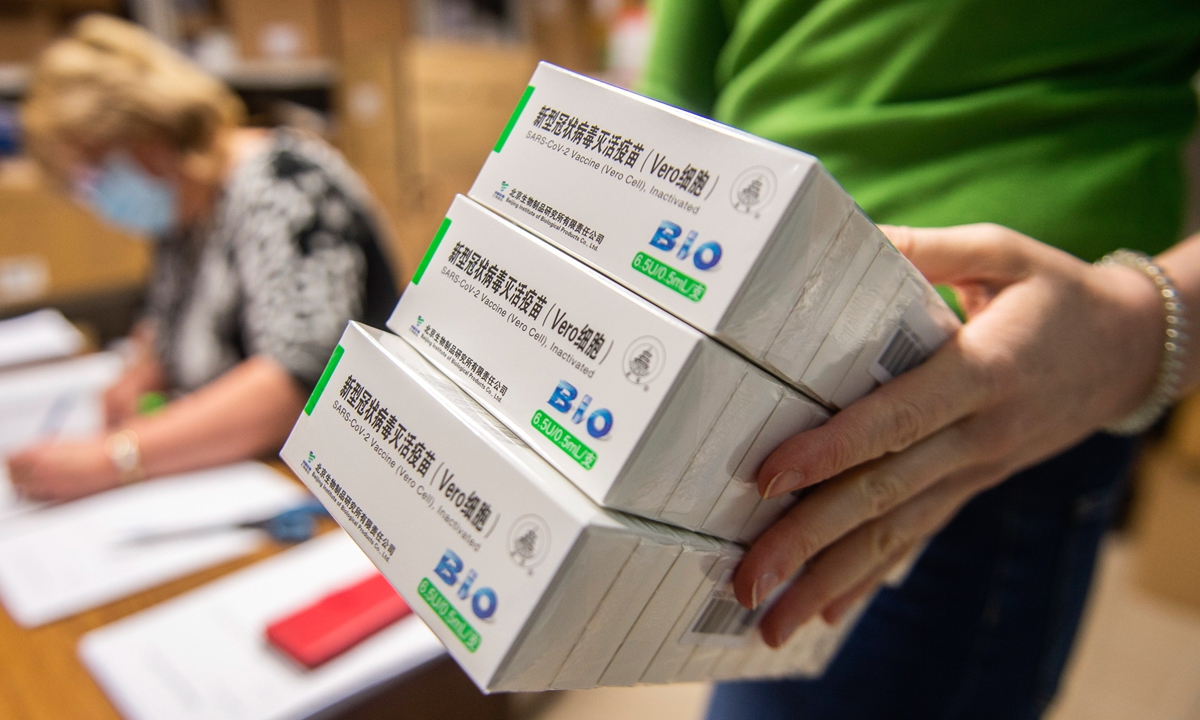
Family doctors receive COVID-19 vaccines produced by Sinophem in Keckemet, Hungary, on February 24, 2021. Photo: Xinhua
GT: Hungary is the first country in Europe to sign a cooperation document with China on the BRI and the bilateral economic relations have prospered in recent years. How do you evaluate the economic relations?
Máté: If you'll allow me, I will take a step back and elaborate a little on the background. There has been a big economic shift from the West to the East. The numbers say it all: 15 years ago for example, 80 percent of global investments were financed by Western companies and 20 percent by enterprises from the economies of the East. By now, 70 percent of total global investments are carried out by Eastern companies and the rest by the West. 15 years ago, 52 percent of global exports were actually carried out by Western enterprises and countries and perhaps 30 percent was done by Eastern companies. By now this gap has almost vanished. Currently, two thirds of container shipments originate from Asia, and the biggest free trade area in the world is also located in Asia.
This means that there are very clear signs that the core of the global economy has shifted from the West to the East, and under these new circumstances, Hungary is trying to extend and deepen pragmatic cooperation with countries on the Asian continent as well, among them being China, to diversify its export and investments portfolio, in order to stay competitive and successful.
During these past few years, economic relations between Hungary and China have experienced the most fruitful period of their existence, and even under the extraordinary circumstances presented by the COVID-19 pandemic, they showed no signs of slowing down: China didn't only emerge as the biggest trading partner of Hungary outside of the EU, but was also the largest source of new foreign direct investment in our country in 2020. With the help of the Hungarian investment promotion system, a positive investment decision was made in the case of 15 projects related to Chinese investors. These 15 projects altogether have created 2,158 new jobs and include an aggregate investment volume of 664 million euros.
I believe that it is in Europe's best interest to be able to build a good and effective cooperation with China, and all platforms that can serve this purpose should be welcomed. I am very pleased to say that currently one of the most important projects by the BRI in our region is the Budapest-Belgrade railway development plan, which sets to elevate said railway section into becoming a key route of Chinese goods meant for Europe.
Recently, the prestigious list of such globally recognized companies as Huawei, Bank of China, BYD, Wanhua, and ZTE was expanded with several Chinese high-tech manufacturing companies: Lenovo, Nanjing Chervon Auto, Semcorp, and Shenzhen Kedali Industry. They all honored Hungary as their investment destination in Europe, enhancing and further deepening the economic partnership between our two countries.
The focus of these high-tech Chinese companies in Hungary is to service the entire European continent, and even beyond. Let's take Huawei for instance, which selected Hungary as the place to establish its largest logistics center outside of China, in order to supply Europe, as well as the Middle East, and Northern Africa with its products. But I could also mention other examples, such as BYD, which established its first self-owned bus plant in Europe in our country, supplying the entire continent with electric buses, or Chinese computer maker Lenovo, which also opened its first (and so far only) European plant, in Hungary. We are proud that our country has become the main entry point for major Chinese enterprises into the European continent, for them to be able to best serve the needs of their local clientele.
I do hope that the bilateral trade will continue to grow and will break several more records in the years to come. I also hope that more and more Chinese companies will choose Hungary as the center of their operations in Europe, based on the many successful examples of major Chinese enterprises which have settled in our country. I also expect that a growing number of Hungarian companies will continue to develop a strong presence in China, and we work continuously to help Hungarian companies in establishing a fruitful cooperation with Chinese partners, entering this incredible and dynamic market environment, and giving our own enterprises a chance to prove themselves on a global scale. I believe that the high expectations of the Chinese market make our business ventures stronger and more competitive. Equal opportunities for Hungarian firms entering China only solidify the ties and bonds between our two nations.
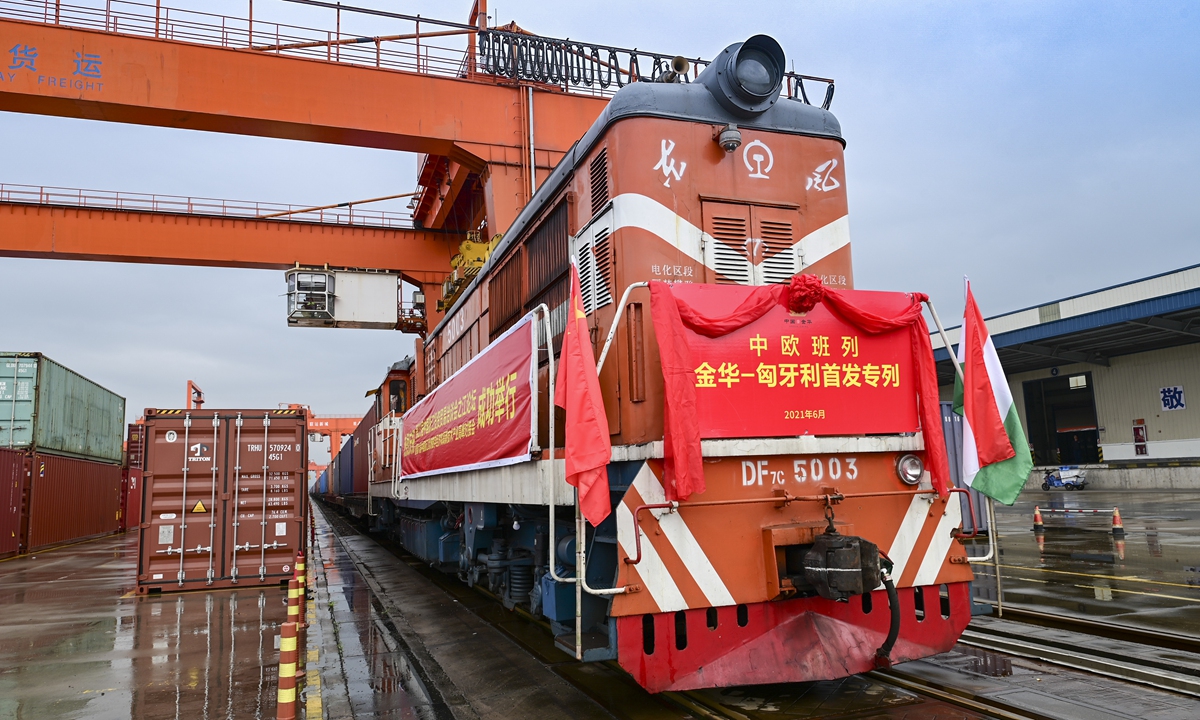
The first China-Europe freight train from the Yangtze River Delta region to Hungary departs from Jinhua, East China's Zhejiang Province for Budapest on June 7, 2021. Photo: VCG
GT: Ambassador, you just mentioned Huawei. There are also different voices from the EU against Huawei's presence in Hungary. What's your thought on this?
Máté: Huawei is a very strong partner to Hungary. The company has been present in Hungary for 16 years, and has achieved remarkable things, continuously expanding the scope of its business activities, providing employment to many local people, and contributing outside of business as well, in areas such as sports or education. The Hungarian government has always put an emphasis on the fair treatment of foreign companies. They are all treated based on their conduct and relevant activities in our country, and not on their country of origin. As long as a company is operating within the legal framework in Hungary and has a significant added value to our economy, it is always welcome in our country, and considered a valued business partner.
GT: We have learned that Hungary hosted the Planet Budapest Sustainability Expo and Summit, which is the largest sustainable expo summit in Central and Eastern Europe. The Chinese government has also attached great importance to sustainability development. Do you think China and Hungary can have more cooperation in the field of environmental protection and sustainable development?
Máté: This Summit focused on offering innovative and efficient solutions to the challenges of sustainability that can be widely applied in most areas of public and government-related fields, as well as raising awareness on sustainability issues of the general population and professional stakeholders alike.
The Expo was organized on a grand scale by the Visegrad Group (the countries also knows as the "V4" including the Czech Republic, Hungary, Poland, and Slovakia), and hosted heads of states, decision makers, and experts in various fields, along with local and foreign visitors, making Planet Budapest 2021 the largest international event in Central Europe dedicated to sustainability.
Regarding cooperation between Hungary and China in the field of sustainability, there already exist many good examples. I could mention the area of smart and clean transportation, renewable and clean energy sources such as solar power, or sustainable water management.
GT: Currently, the China-EU relations are rather tumultuous, and the China-EU Comprehensive Agreement on Investment is currently on hold. In addition, Lithuania has pulled itself from the 16+1 bloc and its provocations toward the one-China principle have led to the downgrading of the diplomatic ties with China. What's your view on these twists and turns?
Máté: As a devoted member of the EU, it is very important for Hungary to preserve the competitiveness and economic success of the Union.
When it comes to EU-China relations, Hungary is a strong advocate for developing an objective and balanced outlook on China that reflects the realities, but also focuses on strengthening our pragmatic cooperation. Hungary is an export-oriented country, therefore we are interested in a free and fair global trade, and as such we maintain an open attitude toward China, focusing on issues that bring us together, instead of those pulling us apart.
I firmly believe that EU-China relations will soon return to a blooming phase, as I see valuable efforts from both sides to mitigate differences. The finalization of the EU-China Comprehensive Agreement on Investment (CAI) was a milestone. I believe we should remain committed to its implementation. Hungary will continue to advocate for a result-oriented approach to China, we hope, that at the end the CAI will be a success story for all of us.
We take our fair share in promoting the positive development of EU-China relations within the 16+1 cooperation format as well, demonstrating to others that the platform is an important addition to general EU-China relations - as we have seen it in the past and still understand it today.
In addition, from July 2021 to end of June 2022, Hungary will hold the rotating Presidency of the Visegrad Group, which will give us an opportunity to deepen cooperation among all the countries involved in the V4 format, to work for a strong and efficient EU, but also, hopefully, to further our cooperation with China within the V4+ format.
GT: Do you believe that China and Hungary have jointly set a good example on how countries with different systems can work together?
Máté: We believe that every country has the right to decide how to manage its own affairs and develop its economic system, and we should respect each other's endeavors. Chinese people know what's best for China, just as Hungarian people know what's best for Hungary. Throughout history, numerous foreign countries have intervened in Hungarian domestic politics, and it's always turned out to be a grave mistake, leading to dire consequences. Trust must be earned, and I believe that both sides have worked hard to earn this trust in our bilateral relationship, with the putting of the needs and benefits of the people before any ideological differences.
In the past, Hungary has advanced bilateral political and economic relations under the principle of non-interference in internal affairs, and will continue to do so in the future, as this is what we expect from all other parties as well.
We are making efforts to show the benefits of our positive engagement with China in a broader context, within different multilateral formats, since we need a constructive East to West cooperation, based on mutual respect and goodwill.
GT: As the Beijing Winter Olympics are set to begin, how goes the preparation work by your national team? What's your view on some US and Western politicians' hyping of a "boycott" of the Beijing Winter Olympic Games?
Máté: We are very proud of our athletes, especially the speed skating team, who will also attend the Beijing Winter Olympics. The speed skating team is an excellent example of the cooperation between our two nations. I am saying this because two members of the team - brothers Liu Shaolin and Liu Shao'ang - are carrying the best of the two nations, one of their parents is Hungarian, the other, Chinese. The team has a Chinese coach as well, who has achieved great results with the entire team.
I believe mixing sports with ideology and politics leads us down the wrong track. We must be mindful of all the efforts and the years of training which lead up to such an event, and that it is the biggest moment of our athletes' lives, which should by no means be used for political purposes. This would be disrespectful to the athletes and all the people that participated in their preparation, as well as putting an enormous and completely unnecessary pressure on our team.
The only sentence that we should echo during the upcoming Olympic Games is "Team Hungary, Jiayou [Go for it] !"

